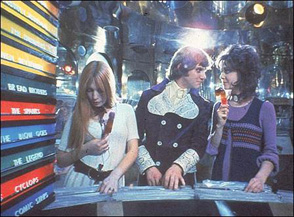|
|
Viking Night: A Clockwork OrangeBy Bruce HallJune 21, 2011
The thing is, A Clockwork Orange is meant to be a satire, which puts it at odds with the way Kubrick shot it. The story is poking fun at the way we get into trouble when we fail to couple values with reason or confuse morality with blind compliance. This is also a narrative with a built in sense of irony, and much of it comes from having a psychopath for a protagonist. But in Kubrick’s hands it becomes more of a lurid, voyeuristic fantasy than the book intended. True, we experience the story from Alex’s point of view, and therefore it shouldn’t shy away from showing the full range of Alex’s brutality. But since he is a teenage boy, it is displayed here in the sort of stylized, comic book way boys think about everything. Most of the characters are buffoonish weirdos: Alex’s meathead peers. Deltoid and his oily detachment. There’s even Alex’s victims, who are eventually turned into grotesque self parodies by his aggression. The whole story is already wet with sneering, belligerent contempt for both its characters and a society it seems to view as complacent and hypocritical. I’m not sure Kubrick’s reductionism helps. He pairs the most of his pivotal scenes with classical music, a technique that worked well for him in 2001: A Space Odyssey. In that movie the net effect was grandiose, but here it hovers somewhere between pretentious and well...funny. Fight scenes are staged with an almost slapstick sense of self awareness and combined with the music it’s kind of...well...funny. And it’s not all classical music. During one particularly ghastly assault Alex belts out a Gene Kelly tune as he goes about his business. What he’s doing isn’t funny, but the juxtaposition of humor and horror often feels comical in a nightmarish way. At times you find yourself in the uncomfortable position of trying to suppress a chuckle as someone is being beaten half to death.
|

|
|
|

|
Friday, November 1, 2024
© 2024 Box Office Prophets, a division of One Of Us, Inc.


